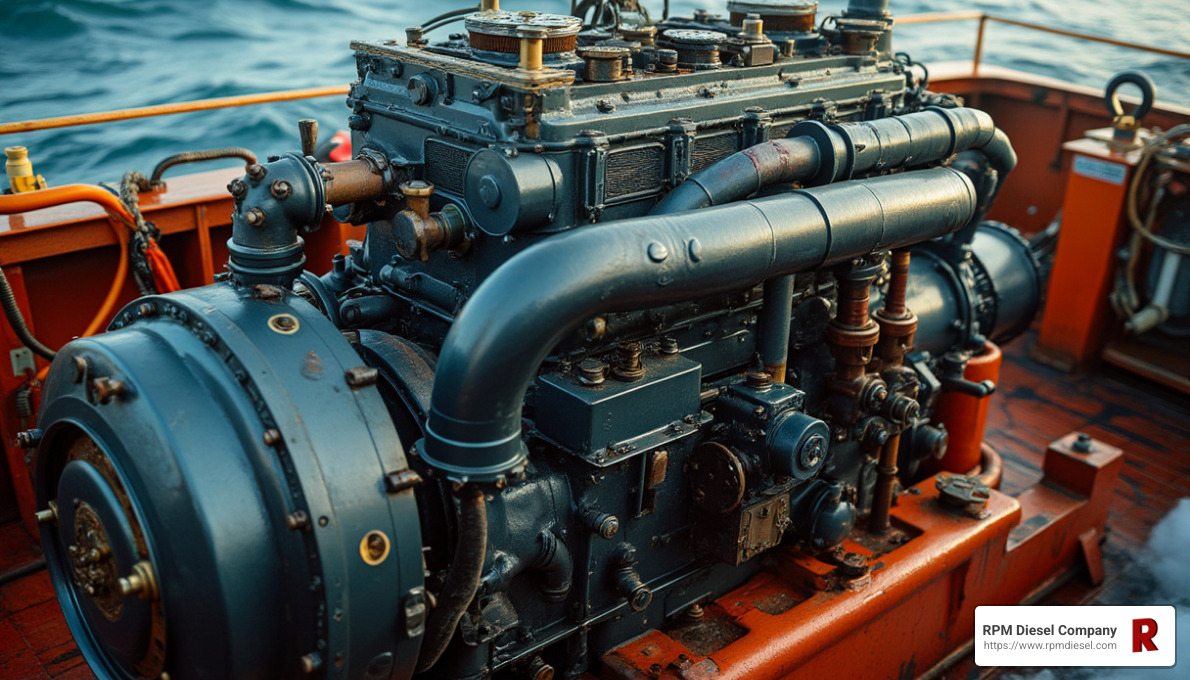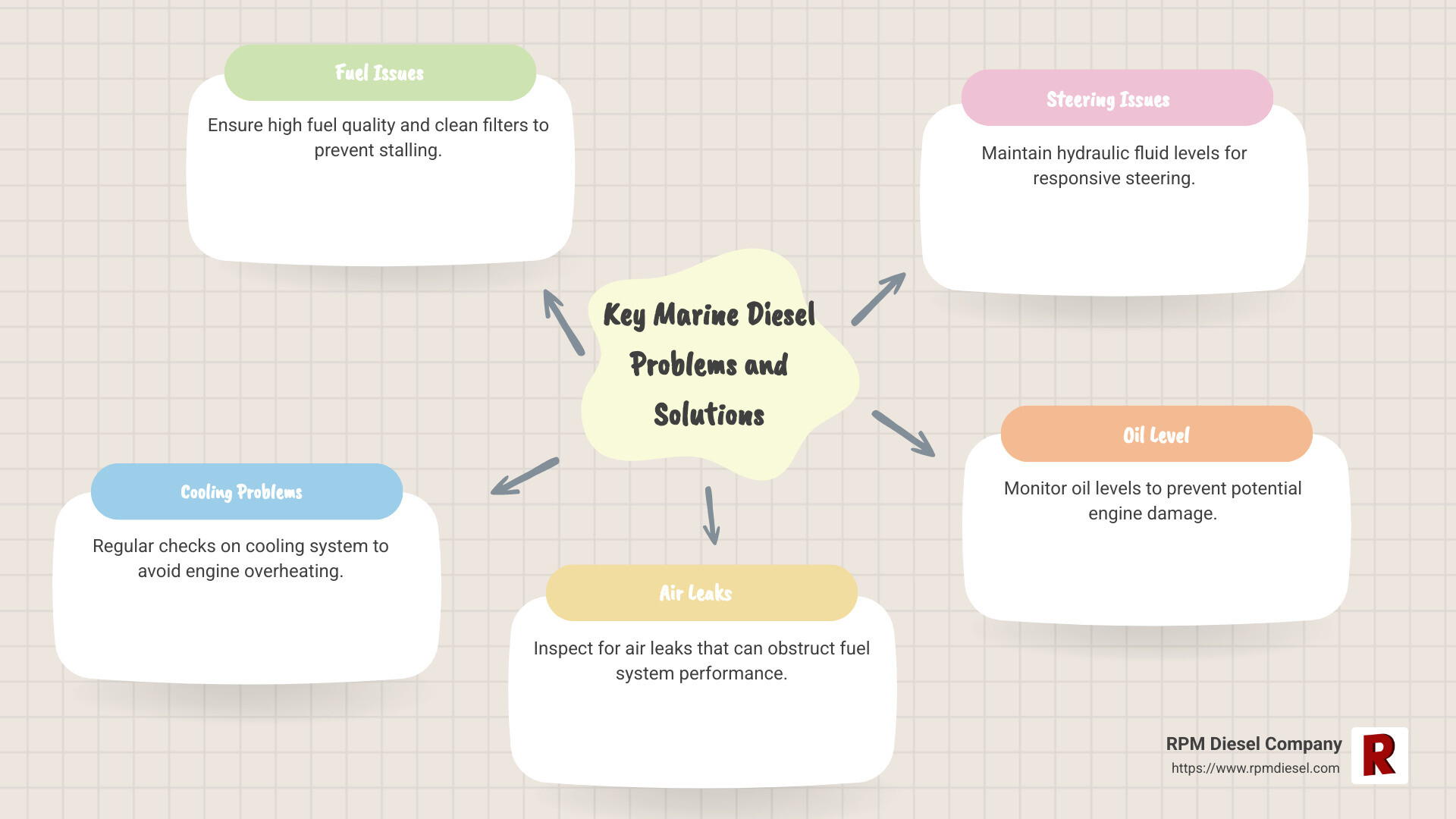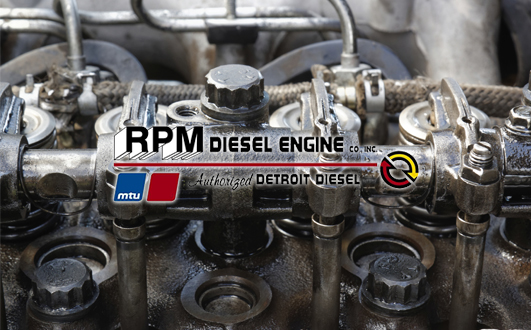
Marine diesel troubleshooting often begins when a vessel’s engine refuses to perform as expected, leaving yacht owners stranded or worried about delays. Understanding the fundamental problems and how to address them can mean the difference between smooth sailing and extended downtime. Here’s a quick look at the main pitfalls every marine diesel engine owner should be prepared for:
- Fuel Issues: Keep an eye on fuel quality and ensure filters are clean to prevent engine stalling.
- Cooling Problems: Regularly check your cooling system to avoid overheating.
- Air Leaks: Inspect for air leaks that can obstruct your engine’s fuel system.
- Steering Issues: Ensure hydraulic fluids are topped up to maintain sharp responsiveness.
- Oil Level: Monitor oil levels to sidestep costly engine damage.
For dedicated yacht owners seeking reliable performance from their marine diesel engines, troubleshooting is a crucial first step in making that happen. With experienced professionals close at hand, like those at RPM Diesel Company, getting back to the open sea becomes a breeze.

Common Marine Diesel Engine Problems
Marine diesel engines are robust, but they do face their fair share of challenges. Understanding these common issues can help you troubleshoot effectively and keep your vessel running smoothly.
Fuel Issues
Fuel problems are a frequent culprit behind engine troubles. Contaminated fuel or clogged filters can lead to sputtering or even engine failure. It’s crucial to regularly check and replace fuel filters and ensure your fuel is clean. This simple step can prevent the engine from stalling and keep it running efficiently.
Overheating
Overheating is a serious issue that can cause significant damage if not addressed promptly. It’s often due to cooling system failures, such as blocked raw-water intakes or faulty water pumps. Make sure to inspect these components regularly and clean them as needed. Also, keep an eye on the impellers and drive belts, as these can wear out and contribute to overheating.
Air Leaks
Air leaks, though sometimes minor, can disrupt the fuel system, leading to performance issues. Listen for any unusual hissing sounds and inspect all air lines thoroughly. Catching leaks early can save you from bigger headaches down the line.
Cooling Problems
Cooling problems can arise from inadequate clearance between engine components or malfunctioning valves. When cooling systems fail, engines can overheat quickly. Regular maintenance of the cooling system, including checking for blockages and ensuring all components are functioning correctly, is essential.
Steering Issues
Steering issues can be particularly frustrating when you’re out on the water. Low hydraulic fluid levels or mechanical problems can cause sluggish or unresponsive steering. Regularly check and replenish hydraulic fluids to maintain smooth and responsive steering.

By staying on top of these common issues and performing regular checks, you can avoid many of the pitfalls associated with marine diesel engines. Professional help is always available at RPM Diesel Company to ensure your engine runs at its best.
Step-by-Step Marine Diesel Troubleshooting
Troubleshooting your marine diesel engine doesn’t have to be daunting. With a systematic approach, you can identify and resolve many common issues. Here’s a step-by-step guide to help you steer the process.
Fuel System Check
Start with the fuel system, as it’s often the root of many problems. Begin by inspecting the fuel tank for contamination. Water or algae in the fuel can cause serious issues. Drain any water from the pre-filter and replace clogged filters promptly.
Next, check the fuel lines for leaks or air bubbles. Air in the system acts like a cushion, preventing the fuel from reaching the injectors at the right pressure. Bleed the system to remove any trapped air, starting from the tank and working your way through each component.
Electrical Issues
Electrical problems can be tricky but are often easy to fix. First, examine all connections for dirt or corrosion. Loose or dirty connections can prevent your engine from starting. Clean and tighten any problematic connections.
If your engine turns over but doesn’t start, check the battery. A weak or dead battery is a common cause of starting issues. Ensure the battery is fully charged and in good condition.
Air in System
Air leaks can disrupt the fuel delivery process. To locate leaks, listen for hissing sounds when the engine is running. Inspect all air lines and seals. If you find a leak, replace the faulty component or seal it properly.
Bleeding the fuel system is crucial if air has entered. Locate the bleed screws and release any trapped air until clear fuel flows out.
Filter Maintenance
Regular filter maintenance is essential for a healthy engine. Clogged filters restrict fuel flow, causing the engine to sputter or stall. Change filters according to the manufacturer’s recommendations or whenever you suspect contamination.
Keep spare filters on board for quick replacements. This proactive step can save you from unexpected breakdowns.
Fuel Contamination
Fuel contamination is a pervasive issue. Always use clean, high-quality fuel to prevent problems. If you suspect contamination, drain the fuel system and refill it with fresh fuel. Regularly check for signs of algae or water in the tank.
By following these steps, you can tackle most marine diesel engine issues head-on. Regular checks and maintenance are key to avoiding costly repairs and keeping your vessel in top shape. For complex problems or professional assistance, RPM Diesel Company is here to help.
Marine Diesel Engine Maintenance Tips
Keeping your marine diesel engine in top condition requires regular maintenance. This not only ensures your engine’s longevity but also improves fuel efficiency and performance. Here’s how you can keep your engine running smoothly.
Regular Maintenance
Routine maintenance is crucial. Check the oil level and color before every outing. Oil that’s too dark or dirty can indicate contamination. Change it according to your engine’s manual.
Lubrication is key. Keep all moving parts well-lubricated to reduce wear and tear. Pay special attention to the oil filter, gaskets, and seals. Regular checks prevent leaks and ensure efficient operation.
Cleaning Techniques
Cleaning your engine is more than just aesthetics. A clean engine runs cooler and more efficiently. For example, the charge air cooler can accumulate dirt and scale, leading to power loss. Clean the air side with compressed air or water, but leave deep cleaning to professionals.
The sea strainer is another critical component. It draws in cooler water to regulate engine temperature. Regularly check it for blockages, as a clogged strainer can cause overheating.
Professional Care
While DIY maintenance is effective, professional care is sometimes necessary. Experts can perform chemical baths to clean components like the charge air cooler more thoroughly. They can also identify potential problems early, saving you from expensive repairs later.
Professional services can also include checking the electrical system. Loose or dirty connections can prevent your engine from starting. Technicians can ensure all connections are secure and corrosion-free.
Spare Parts
Always have spare parts on hand. Keep extra filters, impellers, and gaskets. These are common points of failure that can be quickly replaced if you have the parts available.
This proactive approach can save you from being stranded at sea due to minor issues. It’s a simple step that offers peace of mind.
By following these marine diesel maintenance tips, you can extend the life of your engine and avoid unnecessary repairs. Regular checks, cleaning, and professional care are essential for keeping your vessel ready for any trip.
Frequently Asked Questions about Marine Diesel Troubleshooting
Why is my marine diesel engine turning over but not starting?
A common issue that leaves boaters scratching their heads is when the engine turns over but just won’t start. This problem often stems from fuel-related issues. Before diving into complex diagnostics, ensure that your fuel tank isn’t empty. Faulty gauges can mislead, so a visual check or tank dip can be more reliable.
Electrical problems can also be culprits. A weak battery or corroded connections might not provide enough power to start the engine. Ensuring that battery switches are on and connections are clean can often resolve these issues.
What is the most common problem in diesel engines?
When it comes to marine diesel engines, fuel contamination is a frequent offender. Contaminated fuel can lead to clogged filters, which in turn can cause the engine to sputter or stall. Water or debris in the fuel is often the root cause, and regular filter checks and replacements are essential.
Clogged filters are another prevalent issue. The primary and fine filters play crucial roles in keeping the fuel clean. If clogged, they can restrict fuel flow and prevent the engine from running smoothly. Regular maintenance and timely filter changes can prevent these headaches.

Why is my marine diesel not getting full RPM?
If your engine isn’t reaching its full RPM, lubrication issues might be the cause. Inadequate lubrication can lead to increased friction and overheating, which can limit engine performance. Regularly check and change the oil to ensure proper lubrication.
Oil filter maintenance is equally important. A clogged oil filter can restrict oil flow, leading to similar problems. Keeping an eye on oil pressure and ensuring the filter is clean and functional can help maintain optimal RPM levels.
By understanding these common issues, you can better troubleshoot and maintain your marine diesel engine, ensuring smooth and reliable operation on the water.
Conclusion
At RPM Diesel Company, we understand the importance of keeping your marine diesel engine in top shape. With over 60 years of experience, we offer comprehensive services custom to meet the unique needs of marine diesel engines. Whether it’s routine maintenance, troubleshooting, or sourcing those hard-to-find parts, we’ve got you covered.
Our extensive parts inventory ensures that you have access to the components you need, reducing downtime and getting you back on the water quickly. We are factory-authorized for major manufacturers like Detroit Diesel and MTU, which means you receive genuine parts and services of the highest quality.
Why choose RPM Diesel Company?
- Comprehensive Service: From sales to maintenance, we handle it all with precision and care.
- Extensive Parts Inventory: We stock a wide range of parts, making it easier to find exactly what you need.
- Expert Knowledge: Our team is highly trained and well-versed in the latest diesel technologies.
For all your marine diesel needs, whether it’s a new engine or a repair, trust RPM Diesel Company to deliver exceptional service and support. Learn more about our diesel injector repairs and other services by contacting us today. Let us help you avoid engine pitfalls and keep your vessel running smoothly.
![]()
